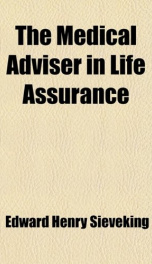the medical adviser in life assurance

Purchase of this book includes free trial access to www.million-books.com where you can read more than a million books for free. This is an OCR edition with typos. Excerpt from book: CHAPTER III. THE DUTIES OF THE MEDICAL OFFICER. The regular employment of medical men to examine candidates for life insurance is a practice of comparatively recent date. The custom of the old offices, prior to about 1820, was for each life proposing, to sign a very distinct and binding declaration, to the effect that the individual had not had " cow or small pox, or any other disease tending to shorten life." No mention seems to have been made of family history. The proposer had to give a reference to " two persons of good repute, one, if possible, of the medical profession." Parties who did not appear before the directors, or who could not refer to a medical gentleman, were required to give a reference to three persons. Since that time the entire aspect of life insurance business has undergone a change ; and while the companies have learned to appreciate the value of skilled medical advice, the members of the medical profession have acquired a direct pecuniary interest in promoting to their utmost the great social andeconomic principles which underlie insurance transactions. We have tried in vain to ascertain approximately the amount of honoraria paid in this way to the medical profession ; but a little reflection will teach the reader that it must be very considerable, seeing that there is scarcely a medical man in the kingdom who is not more or less often applied to for his opinion as to the value of lives for insurance. See History and Constitution of the Equitable Society, by William Morgan, F.R.S. The duties which the medical officer of an insurance company undertakes to perform are o£ a very responsible character, as they involve both the happiness of the applicant and the welfare of the company. The rejection of a candidate not only interferes with his pla...
Info about the book
Author:
Series:
Unknown
ISBN:
0818405066
Rating:
3/5 (3)Your rating:
0/5
Languge:
English
Users who have this book
Users who want this book
What readers are saying
What do you think? Write your own comment on this book!
write a commentif you like the medical adviser in life assurance try:
Other books by this author
Do you want to read a book that interests you? It’s EASY!
Create an account and send a request for reading to other users on the Webpage of the book!


